This is the newsletter version of Sara by the Season, where I explore a little bit of everything that’s on my mind as I try to lean into nature’s wisdom and rhythms. You can listen to me read you the newsletter by hitting play above - or you can click the little link above right to play in your favorite podcast player. If you know someone who would like this sort of thing, I’d be so grateful if you would share it!
“Without attachments, no life.” This is how Andreas Weber begins his book Matter and Desire: An Erotic Ecology, which I am slowly working my way through like a dense spring salad that is full of life and nutrition, but hard to chew nonetheless. I underlined that line three times and put three exclamation points above it because it reaffirmed something I’ve long had a problem with in the yoga and Buddhist circles that I seem to frequent: the idea that the solution to our suffering is to detangle ourselves from all of our attachments.
The first of the Three Poisons in Buddhism is upadana, typically translated as attachment or clinging; Buddhist teaching says that upadana keeps us suffering. In my yoga teacher training, we had to pick one of the yamas, which are the ethical rules according to yoga philosophy, to work with over the course of our training. I read somewhere that the yamas are the “don’t do these” guidelines to a life well lived. I picked (or more accurately, it picked me) aparigraha, which is typically translated as “non-attachment” or “non-grasping.” I spent nearly a year focusing on this concept, and, honestly, I was nearly as angsty about it when yoga teacher training was over as I was when it started, which probably has something to teach me in and of itself.
Aparigraha was (is) so difficult for me because it is precisely my attachments in my life that bring me so much joy: my relationships with my people, my place, the things I care passionately about. In yoga and Buddhist philosophy, the word I’ve seen most often associated with attachment is what these teachings recommend we do with our attachments: surrender them. I don’t want to surrender them because my attachments hold so much (all?) of the good stuff in my life.
For example, I don’t like all twelve year-olds, but I love the particular twelve year-old Jasper version that I get to live with every day. While I appreciate all gardens, I’m attached to and love my specific garden best. I love trees, but I’m attached to a handful of them that are special to me that I pass each and every day. The best part is that, in my attachment to the particulars, I have a larger capacity for love and empathy for all twelve year-olds or gardens or trees or fill-in-the-blank.
I’ve read enough Buddhist and yogic philosophy to know that, when they’re talking about non-attachment, they are probably talking about attachment gone awry - too much of it becomes clingy, possessive, and greedy. I’m probably being willfully difficult just because I don’t like this teaching, but it still comes off sounding to me like “you can’t get hurt if you don’t get too close to anyone or anything,” which, you know, is true. But also: what kind of life is that?
Wendell Berry centers his beautiful Jefferson Lecture (go listen to the whole thing) around the idea that “it all turns on affection,” and by that, he means that good living arises out of affection for ourselves, our communities, and our places. He calls us to be people “motivated by affection, by such love for a place and its life that [we] want to preserve it and remain in it.” Affection and care don’t work in generalities, though. Affection requires specifics, it requires knowledge and wisdom, and it requires time and commitment.
Affection, I think, requires healthy attachment. When we commit to learning about ourselves, our people, and our particular places, affection flows from that posture of curiosity, openness, and, yes, attachment.
Back to Weber who goes on to say:
From cell division to child rearing, we can understand all processes in the biosphere as processes of relationship—and we can learn from them. In these processes, two different positions must be brought into balance such that something altogether new emerges, something that both contains and completely redefines everything that preceded it. This connection of two (or more) different positions in a common cause—one that remains full of contradictions—is perhaps the most general definition of an ecosystem. It is also the precise description of loving attachment.
I’ve been thinking a lot lately about what we miss by only platforming one perspective - by acting like there is only one way to understand a concept, especially an ancient spiritual one. By consistently associating attachment with a need for surrender, what might we be missing? What if, instead, we leaned into curiosity about our loving attachments? What if we noticed how our particular attachments help us to better sympathize or even empathize with others? How might we live differently if we opened our eyes to how the foundation of the whole thing is relationship and attachment, as Weber claims?
Rants and raves
👍 Long spring walks with Wendell.
👍 This framing of connection and control was somehow both mind-blowing and so obvious.
👍 Sleeping in on the front-end. Grant and I have had some heavy stuff to deal with these last few months outside of our little family, and, accordingly, we’re just kind of operating at what feels like a low level of exhaustion all the time. So for the past few weeks, we’ve been encouraging each other to sleep in on the front-end because we can’t do it in the morning. The heavy stuff is still heavy, but we’re a bit better equipped for it when we’re as well-rested as possible.
👎 Biden’s reversal on drilling. What a missed opportunity to use the Russian invasion to demonstrate to people how getting off fossil fuels is the best defense spending there is!

Stuff worth sharing
How do we get this in the inbox of everybody that leads people? I also found a new category of adulting scripts thanks to this piece: phrases to eliminate from your vocabulary. Entry #1 = “kids these days...”
John Haidt with a piece I’ll be thinking about for months.
I came across this, and it was just what I needed this spring week:
Cheers to thinking about your attachments in the week ahead!
Sara








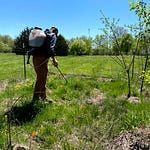
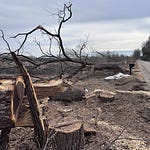

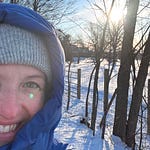

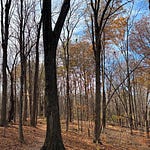
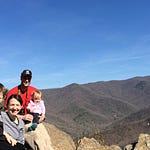
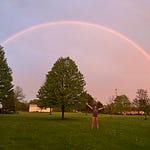
Share this post